Former Board Members
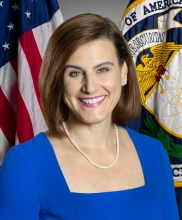
Ms. Joyce L. Connery, a native of Massachusetts, was designated as Chair of the Board by President Biden on January 20, 2021. She was initially appointed to the Board by former President Obama in 2015, where she served as the Board’s Chair from her appointment in August 2015 until January 2017. She was confirmed again by the Senate to be a Member of the Defense Nuclear Facilities Safety Board on July 2, 2020, for a term expiring October 18, 2024. Ms. Connery has had an extensive career in the fields of nuclear security, safety, nonproliferation, and energy policy. Ms. Connery began her career at the national laboratories, first serving in Kazakhstan working on the shutdown of the BN-350 fast breeder reactor and then returning to Washington, DC, to work in the Office of International Safety in the Department of Energy’s (DOE) National Nuclear Security Administration. She has served in several capacities at DOE, including as the senior policy advisor to the Deputy Secretary of Energy. She also served two tours in the National Security Council. From February 2008 through May 2010, she worked in the area of nonproliferation and nuclear security, and from January 2012 through July 2015, she served as Director for Nuclear Energy Policy within the Office of International Economics. Ms. Connery received a B.A. from Tufts University and an M.A.L.D. from the Fletcher School of Law and Diplomacy.
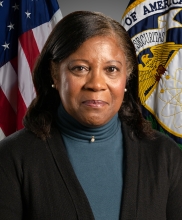
Ms. Jessie Hill Roberson has more than 30 years of experience in the nuclear field in the public and private sectors. She has managed field operations at several Department of Energy Nuclear Plants and has served as Assistant Secretary of Energy for the Environmental Management Program in Washington, DC, where she had leadership responsibilities including operations, safety, financial, and policy matters across the Department of Energy’s Defense Nuclear Complex. She has also served in management roles at several commercial nuclear facilities with responsibilities including plant engineering, regulations/licensing and compliance, nuclear operations, public interface, and emergency management. Ms. Roberson was confirmed by the Senate on July 2, 2020, for a term expiring on October 18, 2023.
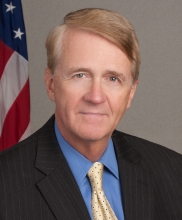
Bruce Hamilton of Dallas, Texas, was appointed Chairman by President Trump on October 3, 2018. Initially appointed to the Board by President Obama on August 26, 2015, he has served as a Board Member, as Vice Chairman, and as Acting Chairman. Hamilton is a veteran of four decades in the nuclear energy field. Prior to his appointment to the Board, he was the president of a nuclear fuel procurement company, and preceding that he was an engineering director at a commercial nuclear power plant where he held a Nuclear Regulatory Commission Senior Reactor Operator’s license. As a U.S. Navy officer, Hamilton supervised nuclear operations in six warships, commanded a seventh, and served as the Reactor Officer for the mid-life refueling overhaul of an aircraft carrier.
A registered professional engineer in the State of Texas, Hamilton’s academic credentials include a B.S. from Texas A&M University, an M.A. from the U.S. Naval Postgraduate School, and a Ph.D. from The Fletcher School of Law & Diplomacy.
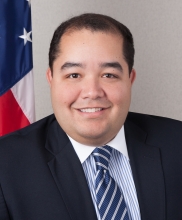
Mr. Daniel J. Santos, a native of Puerto Rico, was appointed a Member of the Defense Nuclear Safety Board on December 16, 2014. Mr. Santos has over 20 years of experience in the nuclear engineering field. Prior to his appointment to the Board, he served at the Nuclear Regulatory Commission as a Senior Technical Advisor and as the Chairman of the Multinational Design Evaluation Program in the Digital Instrumentation and Controls Group. This group include representatives from the regulatory authorities of 15 countries and International Atomic Energy Agency. Before joining the NRC he served at the U.S. Navy's Nuclear Propulsion Headquarters as a reactor controls engineer with increasing responsibilities for a variety of nuclear warships.
A registered professional engineer who also served in the Commonwealth of Virginia professional engineering licensing board, Mr. Santos' academic credentials include a B.S. from University of Puerto Rico, a M.S. from the U.S. Naval Postgraudate School, and a M.B.A. from the University of Maryland.
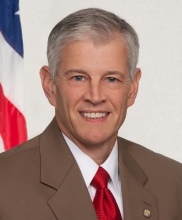
Mr. Sullivan is a graduate of the U.S. Naval Academy, and served as a U.S. Navy submarine officer for twenty-six years before retiring at the grade of Captain in 2006. During his Navy career Mr. Sullivan was extensively involved in all aspects of operations, maintenance, and oversight of naval nuclear reactors and nuclear weapons. He is a graduate of several technical courses, including a year of nuclear power training, as well as senior level training regarding the supervision and oversight of a naval nuclear propulsion system and nuclear weapons. In his various assignments he has performed and supervised nuclear propulsion plant and weapons radiation monitoring, contamination control, preventive maintenance and repair of naval nuclear propulsion plants and preventive maintenance of nuclear weapons systems. Additionally, he has extensive experience in personnel training and qualification programs in both the ship and shipyard environments.
Mr. Sullivan had several key U.S. Navy assignments, including executive officer of the ballistic missile submarine USS Maryland and commanding officer of the fast attack submarine USS Jefferson City. In his last Navy assignment, Mr. Sullivan served as commanding officer of the Naval Submarine Base New London where he provided leadership and oversight to base operations supporting eighteen nuclear powered submarines and approximately one hundred major facilities.
After leaving active duty, Mr. Sullivan practiced law as a civil litigation attorney for five years with the firm of Brown Jacobson, P.C. in Norwich, Connecticut in the areas of torts, employment law, land use, and municipal law. In 2011, Mr. Sullivan became a partner at Sonalysts, Inc. in Waterford, Connecticut where he provided direct support to the U.S. Navy Strategic Systems Programs Office for the next-generation ballistic missile submarine under development by the U.S Navy and the Royal Navy.
Mr. Sullivan earned a bachelor’s degree in marine engineering from the United States Naval Academy, a Master of Arts in National Security Affairs from the Naval War College and a law degree from the University of Connecticut. He is a member of the state bar of Connecticut. He served from 2009 to 2012 on the Ledyard Town Council.
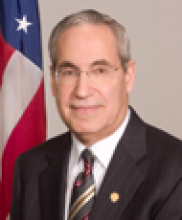
Dr. Peter S. Winokur of Maryland was appointed a Member of the Defense Nuclear Facilities Safety Board on October 23, 2006. He was appointed by President Obama as the Board’s third Chairman on March 19, 2010, and continued to serve as Chairman until his retirement on January 3, 2015. Dr. Winokur has more than 40 years of experience as a scientist and engineer in the field of radiation effects science, technology, and hardness assurance in support of military and space systems. A Fellow of the Institute of Electrical and Electronic Engineers and the American Physical Society, he was selected as one of the most highly cited researchers in Engineering by the Institute for Scientific Information, which lists the 250 most highly cited researchers in the world in given scientific fields.
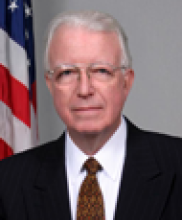
Mr. Joseph F. Bader, of the District of Columbia, was appointed a Member of the Defense Nuclear Facilities Safety Board on November 30, 2004 and was re-nominated by the President and confirmed on March 19, 2010. Mr. Bader has held executive and senior management positions primarily in the nuclear weapons complex and nuclear power sectors for Hill International, Inc., Fluor Daniel, Inc., Urenco, Inc., Exxon Nuclear and Westinghouse Electric Corporation.
He has conducted numerous program/project reviews and has extensive knowledge of design, construction management and operations of R&D facilities, materials production, and power plants. Mr. Bader set up and managed the Fluor Daniel Arlington, VA, office involved in the DOE Weapons Complex Reconfiguration Program. Mr. Bader received a B.S. in Mechanical Engineering from Villanova University, and an M.S. in Nuclear Engineering from the University of Virginia.
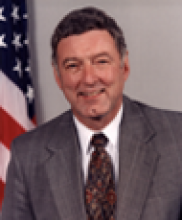
Dr. Mansfield is an accomplished theoretical physicist with an exceptionally broad range of experience, both within and outside government, in the management of technology support to national defense programs. From the base of his academic work in elementary particle theory, philosophy, and classical languages, Dr. Mansfield has expanded his interests and contributions to a wide variety of areas of physics, engineering, operations analysis, and political-military studies in support of the national defense and civil space programs.
Resume
1997 - Present Member, Defense Nuclear Facilities Safety Board Nominated by President Clinton, re-nominated by President Bush and confirmed in 2003. Nominated as Vice Chairman by President Bush and confirmed in 2007. Served as Vice Chairman until June 23, 2010. 1994 - 1997 Associate Administrator for Space Access and Technology, National Aeronautics and Space Administration, development of advanced technologies for space launch and satellite systems1989 - 1994 Professional Staff Member, Committee on Armed Services, United States Senate, strategic submarines, missiles, aircraft, and nuclear weapons 1986 - 1989 Defense Advanced Research Projects Agency, Director of Strategic Technology Office and Chief Scientist of DARPA, research on target recognition, precision weapons, and advanced technologies 1984 - 1986 House Armed Services Committee, Professional Staff Member, nuclear weapons and testing, strategic systems, Air Force research and development 1982 - 1984 Defense Nuclear Agency, Assistant to the Deputy Director (Science and Technology) for Theoretical Research, nuclear weapons effects, radiation simulators, underground tests, support to theater commanders, security and survivability of nuclear weapons 1976 - 1982 Defense Intelligence Agency, Chief, Nuclear Energy and Applied Sciences Division, foreign nuclear weapons, reactors, and advanced technologies 1971 - 1976 Science Applications, Inc., Staff Scientist, Principle Scientist, Program Manager, nuclear weapons effects, nuclear reactor safety1968 - 1970University of Notre Dame, postdoctoral fellow, theoretical physics, elementary particles
Education
- Ph.D., Harvard University, 1970: Theoretical Physics
- A.M., Harvard University, 1966: Physics
- Ph.L., St. Louis University, 1963: Licentiate in Philosophy
- M.S., St. Louis University, 1963: Mathematics
- A.B., University of Detroit, 1960: Classical Latin and Greek
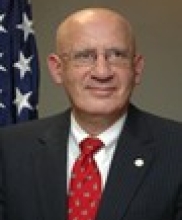
Dr. Kenneth L. Mossman of Scottsdale, Arizona was confirmed by Congress on November 14, 2013, for a term expiring October 18, 2016. He joined the Board after a 40 year career in higher education as a faculty member at both Georgetown University and Arizona State University. Throughout his career, Dr. Mossman received numerous awards and served on a number of national and international advisory groups. Dr. Mossman passed away in January, 2014, shortly after joining the Board.
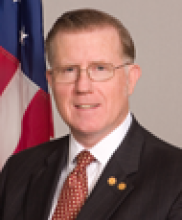
Larry W. Brown was confirmed by the U.S. Senate in September 2006 to be a member of the Defense Nuclear Facilities Safety Board. Prior to 2001, Mr. Brown served on active duty in the United States Navy, and on retirement in 1996 completed a law degree. He began his military service as a Seaman Recruit and retired as a United States Navy Captain after having served from 1963 to 1996 onboard ten ships, including nuclear submarines, destroyers, frigates, supply ships, and a nuclear aircraft carrier. He retired from the Board in February, 2011. Early in his career he qualified in nuclear plant operations on three naval nuclear reactors.
His last two sea tours were as Commanding Officer of the Guided Missile Destroyer USS LUCE (1989-91), and of the Guided Missile Frigate USS MAHLON S. TISDALE (1991-92), respectively. While serving as Commanding Officer, his ships earned many awards including the Chief of Naval Operations Safety Award and the Squadron nomination for the Pacific Fleet Lamps (Helicopter) Safety Award. He earned six personal awards while serving in the United States Navy, including the Legion of Merit for service on the staff of the Chief of Operations in 1996.
Upon retirement he completed law school and subsequently worked as an attorney before joining the Administration in 2001. Mr. Brown was assigned to the U.S. Department of Energy (DOE) and worked as the Senior Policy Advisor for nuclear, spent fuel and non-proliferation and nuclear security issues. In this role he provided recommendations on a broad cross-section of key issues to the Office of Nuclear Energy, the Office of Environmental Management, the Office of Non-proliferation and International Security, the Under Secretary, and the Deputy Secretary of Energy.
As a DOE Senior Policy Advisor he coordinated efforts to capture value from the government’s uranium inventories, while encouraging private industry to modernize nuclear fuel cycle facilities in the United States. His efforts contributed to the resolution of private claims for prior transfers of 9,950 tons of contaminated natural uranium, decontamination of nearly 15,000 tons of technetium contaminated natural uranium, and recognition of the value of the government’s large inventory of high assay depleted uranium. At the end of his term at DOE, the stagnant U.S. uranium enrichment industry, which previously had no concrete plans for deployment of new enrichment technology, had begun two privately funded technology development and deployment initiatives.
In 2005 the Deputy Secretary directed him to lead the DOE Task Force that developed the Global Nuclear Energy Partnership (GNEP), subsequently a Presidential initiative, with the objective of eliminating the major impediments to the expansion of commercial nuclear energy, including — on a global scale — closing the nuclear fuel cycle, reducing commercial nuclear waste and stemming the illicit spread of sensitive nuclear technologies. In 2006 Mr. Brown was presented the Secretary of Energy’s Silver Award in special recognition of his work on the President’s Global Nuclear Energy Partnership.
His last position at the Department of Energy before joining the Board was the Deputy Assistant Secretary for Corporate Business Operations in the Office of Nuclear Energy where he spearheaded the GNEP international initiative, which has since been embraced by all the world’s major nuclear power nations, and many others.
Since reporting to the Board, Mr. Brown has visited all the defense nuclear sites multiple times, focusing attention on the facilities material condition, formality of operations, and safety issues associated with wet chemistry operations. In addition he has highlighted the importance of DOE establishing the robust radiological safety Research and Development program discussed in the Board’s recommendation 2004-1, and strengthening government contractor oversight principally through thoroughly qualified and adequately staffed Facility Representative (FACREP) programs at each defense nuclear site.
Separate and apart from his duties as a Board Member, he has continued to participate in conferences discussing the future of commercial nuclear power, speaking principally on the issues of non-proliferation of sensitive technologies. In 2007 he spoke on the subject of non-proliferation at the GNR2 (Global Nuclear Fuel Reprocessing and Recycling) Conference, and at the Howard H. Baker Center for Public Policy conference on “The Role of Nuclear Power in Global and Domestic Energy Policy: Recent Developments and Future Expectations”, and for the third time he participated in the bi-annual US-Japan Workshop on Nuclear Energy.
Education
- J.D., Georgetown University Law Center, 1998. He is licensed to practice law in the Commonwealth of Virginia, the State of Maryland, and the District of Columbia.
- M.A., United States Naval War College, Newport, RI, 1993, (National Security and Strategic Studies).
- B.A., University of Colorado, 1972.(Physics)

